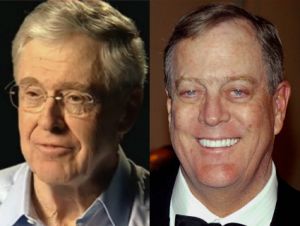 On Thursday, the California attorney general and the state's top election watchdog named the "Koch brothers network" of donors and dark-money nonprofits as the true source of $15 million in secret donations made last year to influence two bitterly fought ballot propositions in California. State officials unmasked the Kochs' network as part of a settlement deal that ends a nearly year-long investigation into the source of the secret donations that flowed in California last fall.
On Thursday, the California attorney general and the state's top election watchdog named the "Koch brothers network" of donors and dark-money nonprofits as the true source of $15 million in secret donations made last year to influence two bitterly fought ballot propositions in California. State officials unmasked the Kochs' network as part of a settlement deal that ends a nearly year-long investigation into the source of the secret donations that flowed in California last fall.As part of the deal, two Arizona-based nonprofits, the Koch-linked Center to Protect Patients Rights and Americans for Responsible Leadership, admitted violating state election law. The settlement mandates that the two nonprofits pay a $1 million fine to California's general fund, and the committees who received the secret donations at the heart of the case must also cut a check to the state for the amount of those donations, which totaled $15.08 million.
But those hoping to get the identities of the actual donors behind this dark money scheme are mostly out of luck. The settlement deal does not include the names of any flesh-and-blood donors—just the names of the shadowy nonprofits that shuffled money around the country during last year's elections. However, partially redacted documents released by the Fair Political Practices Commission do point to a few major donors involved in this dark money daisy chain, including investor Charles Schwab, machine tool magnate Gene Haas, Gap chairman Bob Fisher, and prominent philanthropist Eli Broad.
California officials hailed the settlement as a new record, but conceded that full disclosure was out of their reach. "This case highlights the nationwide scourge of dark money nonprofit networks hiding the identities of their contributors," Ann Ravel, the chairwoman of California's Fair Political Practices Commission, said in a statement. "The FPPC is aggressively litigating to get disclosure and working on laws and regulations to put a stop to these practices in California."
Malcom Segal, the attorney for CPPR, one of the two Arizona nonprofits named in the settlement, said in a statement that his client made an honest mistake in this case. "They believed they were in compliance," Segal said. "But the FPPC believed they were mistaken about their compliance and (under state law) even a mistake is punishable conduct."
The settlement documents (read them here) give the clearest picture yet—without naming names—of the convoluted path that led to more than $15 million in secret donations ending up in California's 2012 election season. Here's how they did it.
In the spring of 2012, the documents say, a California-based fundraiser and consultant named Tony Russo began raising money to influence two ballot measures up for a vote in California that November. Russo sought money to defeat Proposition 30, which would have raised taxes on California's wealthiest citizens, and to pass Proposition 32, which would have hindered the ability of labor unions to raise money for political purposes. To defeat these ballot measures, Russo told prospective donors they could donate directly to a California political action committee and be disclosed—or they could contribute to Americans for Job Security, a Virginia-based nonprofit that does not disclose the names of its donors.
One potential donor courted by an ally of Russo's was Charles Koch, the chairman and CEO of Koch Industries. In an email obtained by California investigators, Russo's ally asks Koch to give "several million" to defeat Proposition 32. Koch Industries said in a statement that "we did not support, either directly or indirectly, this ballot initiative, which would have restricted public and private sector employees' rights to contribute to candidates."
By October 2012, Russo had steered nearly $29 million for his Props. 30 and 32 advocacy campaign to Americans for Job Security. But there was a problem. Election day was less than two months away, and the way campaign law works, the standards for disclosing donors get tougher within that two-month window. So, out of fear that its donors could somehow be revealed, AJS and its lawyers took precautions, choosing to funnel the money through the Center to Protect Patients Rights, which was run by Sean Noble, who was then the primary outside consultant and strategist to the Koch brothers' national donor network. The settlement documents indicate that AJS made three, no-strings-attached donations to Noble's group: $4.05 million on September 10, 2012, $14 million October 11, 2012, and $6.5 million.
Here, the money trail forks into two trails. In one direction, CPPR gave $7 million to a nonprofit called the American Future Fund, which in turn passed $4.08 million of that to a subsidiary in California. That subsidiary, the California Future Fund for Free Markets, finally spent the money on influencing Props. 30 and 32.
In the second direction, CPPR directed $13 million to its Arizona neighbor, Americans for Responsible Leadership. ARL then passed $11 million of that money to the Small Business Action Committee in Sacramento, which spent the money influencing Props. 30 and 32.
Here's the bottom line: A California fundraiser raised a boatload of money. He shuffled it through a network of secretly funded nonprofit groups to hide the donors' identities. And when the money finally arrived in California in time to influence the 2012 elections, the fingerprints on the money had been thoroughly scrubbed off—and in the process, the operatives masterminding this scheme had broken the law.
"This is a nationwide issue," said FPPC chairwoman Ann Ravel. "These groups exploit loopholes in the law to undermine the clear purpose of the law: to give essential information to the public."
Original Article
Source: motherjones.com
Author: Andy Kroll
No comments:
Post a Comment